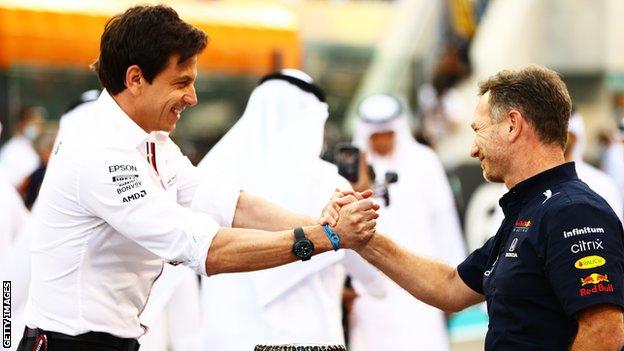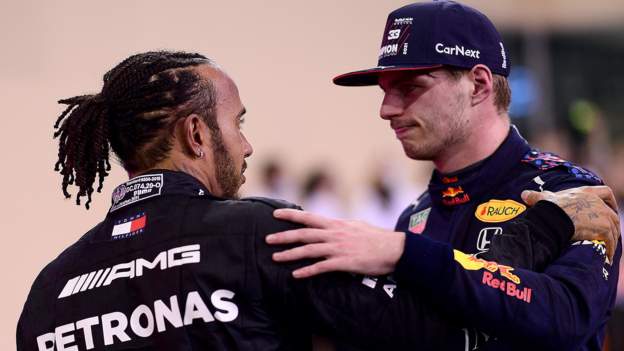
Mercedes have decided not to pursue their appeal against the results of the title-deciding Abu Dhabi Grand Prix.
Their move follows a decision by governing body the FIA to conduct a “detailed analysis” of the end of the race and an admission it was “tarnishing” Formula 1’s image.
Mercedes said they “welcomed” the move and would “hold the FIA accountable”.
Max Verstappen’s Red Bull overtook Lewis Hamilton’s Mercedes on the last lap to clinch the drivers’ title.
Mercedes had two protests rejected by F1 officials on Sunday, with the team arguing race director Michael Masi did not apply the rules correctly.
The Australian appeared not to follow standard protocol on restarting the race after a late-race safety-car period. His decisions left Hamilton, who had led for the vast majority of the race and was on course for the world title, as a sitting duck on old tyres, with Verstappen behind him on fresh rubber.
Mercedes said they had been in “constructive dialogue” with the FIA since the race in an attempt to “create clarity for the future”.
The team were satisfied with the decision to “thoroughly analyse what happened in Abu Dhabi and to improve the robustness of rules, governance and decision making in Formula 1”.
In a lengthy statement, they said they “welcomed” the FIA inviting teams and drivers to take part in the investigation.
Mercedes also offered congratulations to Verstappen and Red Bull, adding: “We would like to express our sincere respect for your achievements this season. You made this F1 championship title fight truly epic.”
Why have Mercedes stood down?
Mercedes said that they protested against the results of the race “because the safety car regulations were applied in a new way that affected the race result, after Lewis had been in a commanding lead and on course to win the World Championship”.
Masi made two key decisions that appear to be against the rules.
He chose to allow only some of the lapped cars that were interspersed through the order past the leading cars.
He also did not follow the stipulations in the rules around the timing of the restart of the race once the lapped cars had been allowed through.
These decisions meant that not all drivers in the field were treated equally – Verstappen had a clear run at Hamilton, for example, but there were still lapped cars between the Dutchman and third-placed Carlos Sainz’s Ferrari – and they ensured the safety car came in a lap earlier than it should have done according to the rules.
The race was restarted for one lap and the Dutchman passed Briton Hamilton to win the race and take the drivers’ title.
The FIA initially defended Masi’s decisions. The stewards, in rejecting Mercedes’ protests on Sunday, claimed the next clause in the rules allowed Masi to do what he did, and cited a rule that gave him authority over the safety car.
But the FIA’s decision to launch a review of the events of the race is an effective admission that mistakes were made.
The FIA’s statement did not mention Masi, whose actions in the race are at the centre of the controversy. His future as race director is in doubt.
Mercedes’ announcement came an hour or so after Susie Wolff, wife of Mercedes F1 boss Toto Wolff and boss of the Venturi Formula E team, criticised the FIA in a strongly worded statement of her own.
Wolff said that the events in Abu Dhabi had left her “with a sick feeling”.
She said Verstappen and Red Bull were “deserving winners and we always knew it was a strong possibility we may not win – but the way in which Lewis was robbed has left me in utter disbelief”.
Wolff added: “The decision of one person within the governing body who applied a rule in a way which has never been done before in F1 singlehandedly decided the F1 drivers’ championship.
“Rules are rules; they can’t be changed on a whim by one individual at the end of a race.”
She concluded: “I hope by March next year there is a governing body with sporting integrity and fairness at its core so I can fall back in love with F1.”
